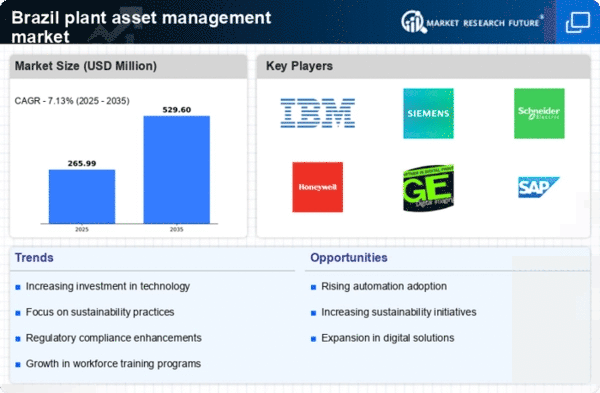Rising Labor Costs
Rising labor costs in Brazil are prompting companies to seek more efficient asset management solutions. As wages continue to increase, businesses are compelled to find ways to reduce operational expenses. This situation has led to a greater reliance on automated plant asset-management systems that can streamline processes and minimize the need for manual labor. Reports indicate that companies adopting these systems have experienced a reduction in labor costs by up to 20%. Consequently, the plant asset-management market is likely to see increased demand as organizations look to leverage technology to counteract rising labor expenses.
Focus on Operational Efficiency
A pronounced focus on operational efficiency is driving the plant asset-management market in Brazil. Companies are under pressure to optimize their operations and minimize waste, which has led to an increased interest in asset management solutions. The Brazilian manufacturing sector, for example, has reported a 15% increase in productivity through the implementation of effective asset management practices. This trend indicates that businesses are prioritizing the management of their physical assets to enhance overall performance. As organizations strive to achieve higher efficiency levels, the plant asset-management market is expected to benefit from this growing emphasis on operational excellence.
Adoption of Advanced Technologies
The adoption of advanced technologies, such as IoT and AI, is transforming the plant asset-management market in Brazil. Companies are increasingly integrating these technologies to enhance operational efficiency and reduce downtime. For instance, the implementation of IoT devices allows for real-time monitoring of equipment, which can lead to predictive maintenance strategies. This shift is reflected in a reported increase of 25% in the adoption of smart asset management solutions among Brazilian firms. As organizations recognize the potential for cost savings and improved asset performance, the demand for sophisticated plant asset-management systems is likely to rise, further propelling market growth.
Environmental Regulations and Compliance
The tightening of environmental regulations in Brazil is influencing the plant asset-management market. Companies are now required to adhere to stricter compliance standards, which necessitates the implementation of effective asset management practices. This regulatory landscape encourages organizations to invest in systems that can help monitor and manage their environmental impact. As a result, the market for plant asset-management solutions is expected to grow, driven by the need for compliance with environmental laws. Firms that proactively adopt these systems may not only avoid penalties but also enhance their reputation, further fueling demand in the plant asset-management market.
Investment in Infrastructure Development
The ongoing investment in infrastructure development in Brazil appears to be a crucial driver for the plant asset-management market. The Brazilian government has allocated substantial funds, estimated at $30 billion, for infrastructure projects aimed at enhancing transportation, energy, and utilities. This investment is likely to stimulate demand for efficient asset management solutions, as companies seek to optimize their operations and reduce costs. Furthermore, the need for improved asset tracking and maintenance in these sectors suggests a growing reliance on advanced plant asset-management systems. As infrastructure projects progress, the plant asset-management market is expected to experience significant growth, driven by the necessity for effective management of physical assets.

















